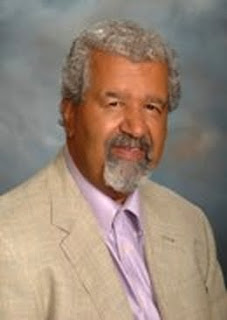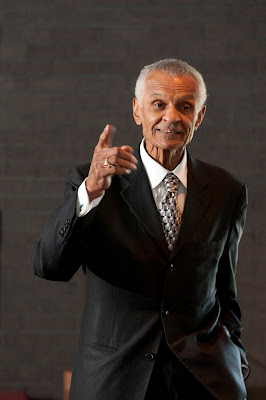"What was most impressive about him was that he was such a humble man even in all of his fame." - Dr. Nina Harris, School of Public Policy
Professor Emeritus Ronald Walters, an internationally recognized political scientist, died on September 10 after a long illness. He was 72.
Walters had an illustrious career as a teacher, writer, researcher and political activist. He played major roles in the presidential campaigns of the Rev. Jesse Jackson, and won many prestigious academic and publishing awards.
Walters wrote a weekly syndicated column of political commentary that appeared in newspapers around the nation. He remained a powerful intellectual and political force until his death.
 | "Ron Walters was an eminent and inspiring professor, teacher, author, mentor and human being," said Acting University President Nariman Farvardin. "He had a great impact and made a real difference in the world and to all those who knew him. His death is a tremendous loss. Our sincerest condolences go out to his wife, Patricia, and all his family."
This past August in one of Walters' last weekly syndicated columns, he shared his view from the mountain - looking back at the civil rights movement he had taken part in and to the future that he hoped to shape. |
He recalled Washington in August, 1963, and the "progressive spirit of the original nonviolent march, which held out the hope of racial reconciliation, and that America would finally cash a check of justice that would allow all of us to invest in the great project of democracy."
Then, Dr. Walters reminded his readers that there is still "work to be done...at home," and that African Americans "should try out their local mobilization legs" to prepare for the fall elections. The stakes will be high, he reminded - "jobs and justice and respecting the values of the movement for which so many people gave their lives, time and energy."
Before retiring from fulltime work in July of 2009, Walters carried three major titles at the University of Maryland: Director of the African American Leadership Institute, distinguished leadership scholar at the James MacGregor Burns Academy of Leadership, and professor of government and politics. He was internationally known for his expertise on African American leadership and politics, his writing, and his teaching.
"Ron was an inspiration to all, especially those aspiring to be future leaders," recalls his Academy colleague, Nina Harris. "He touched the lives of students through his teaching and mentoring and will be missed by so many. There was a constant stream of media setting up in the Academy of Leadership Library to conduct interviews but yet he seemed unfazed by it all. He was a part of our family, and I am grateful that I was able to be a part of his journey."
Dr. Walters is survived by his wife, Patricia Ann Walters.
CAREER
Walters' career blended academic achievement, a bookshelf of publications and significant political activity. He held senior positions in both of Jesse Jackson's runs for the White House and lived to see the first African American to hold the U.S. presidency.
Walters received his Bachelor of Arts degree in History and Government with Honors from Fisk University (1963) and both his M.A. in African Studies (1966) and Ph.D. in International Studies (1971) from American University.
Prior to coming to the University of Maryland in 1996, Walters served as professor and chair of the political science department at Howard University, assistant professor and chair of Afro-American studies at Brandeis University, and assistant professor of political science at Syracuse University. Also, he served as visiting professor at Princeton University and as a fellow of the Institute of Politics at the Kennedy School of Government, Harvard University.
Walters was a former member of the governing council of the American Political Science Association. Walters also served as the senior policy staff member for Congressman Charles Diggs, Jr. and Congressman William Gray.
In 1984, Walters served as deputy campaign manager for issues of the Jesse Jackson campaign for president, and in 1988, was consultant for convention issues for the Jackson campaign, then directed by former Secretary of Commerce Ron Brown. He served as board member of the Black Leadership Forum, the National Coalition of Black Civic Participation, and other organizations.
PUBLICATIONS
Dr. Walters wrote over 100 articles and ten books. His book, Black Presidential Politics in America, (1989), won the American Political Science Association's Ralph Bunche Prize and the Best Book award from the National Conference of Black Political Scientists (NCOBPS). Pan Africanism in the African Diaspora (1993) also won the NCOBPS Best Book award.
His most recent books were White Nationalism, Black Interests: Conservative Public Policy and the Black Community (2003), Freedom Is Not Enough: Black Voters, Black Candidates, and American Presidential Politics (2005), and The Price of Racial Reconciliation (2008).
The University of Maryland libraries summarizes some of his major publications online.
RECOGNITION
Walters won many awards, including a distinguished faculty award from Howard University (1982), Distinguished Scholar/Activist Award, Black Scholar Magazine (1984), W.E.B. DuBois/Frederick Douglass Award, African Heritage Studies Association (1983), the Ida Wells Barnett Award, Association of Black School Educators, (1985), the Fannie Lou Hammer Award, National Conference of Black Political Scientists (1996), Distinguished Faculty Contributions to Campus Diversity, University of Maryland (1999), and the Ida B. Wells-W.E.B. DuBois Award for Distinguished Scholarship from the National Council for Black Studies (2000).
He was awarded the honor of "Alumnus of the Year" by the School of International Service of the American University in 2000.
Walters frequently appeared on local and major media as an analyst of African American politics, such as CNN, CBS News, Nightline, NBC Today Show, C-SPAN, the PBS Newshour and Think Tank, and All Things Considered (NPR). Walters wrote a weekly opinion column for the National Newspaper Publishers Association News Service and Web sites.
Memorial plans have not yet been announced.
University of Maryland For Immediate Release September 11, 2010 Contacts: Neil Tickner, 301 405 4622 or
ntickner@umd.edu































